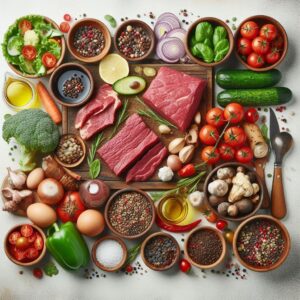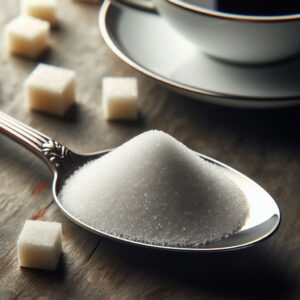10 Worst Foods For Prostate Health: Protect Your Manhood with This Ultimate Guide

10 Worst Foods For Prostate Health: Sneaky Foods Sabotaging Your Prostate
Gentlemen, have you ever heard the saying, “You are what you eat?” Well, when it comes to your prostate, it couldn’t be truer. Your dietary choices play a huge role in the health of this vital gland. So, what if I told you that some seemingly innocent foods could be wreaking havoc on your prostate?
In this comprehensive guide, we’ll expose the top 10 prostate-punishing foods and offer mouthwatering alternatives to keep your manhood in tip-top shape. No more vague advice or confusing jargon—just straightforward, actionable tips to supercharge your prostate health. Here are the culprits:

1. Red Meat: The Prostate’s Worst Nightmare
Think of your prostate like a car engine. You wouldn’t fuel it with sludge, right? Well, piling on red meat, especially those processed favorites like bacon, sausage, and hot dogs, is the dietary equivalent of clogging your prostate’s gears.
But why is red meat so bad for your prostate?
- Saturated Fat Overload: These meats are like saturated fat bombs, raising your cholesterol levels and promoting inflammation. This nasty combo can irritate your prostate and increase your risk of problems like benign prostatic hyperplasia (BPH) and even cancer.
- Heterocyclic Amines (HCAs): Ever noticed those charred bits on grilled meats? Those are HCAs, cancer-causing compounds that form when meat is cooked at high temperatures. HCAs have been linked to various cancers, including prostate cancer.
- Iron Overload: Red meat is rich in iron, which is essential in moderation. However, excessive iron can act as a catalyst for cancer cell growth, potentially fueling prostate cancer.
Your Prostate-Friendly Protein Alternatives
Don’t worry, guys; giving up red meat doesn’t mean sacrificing flavor or protein. Here are some mouthwatering alternatives that will keep your prostate happy and your taste buds satisfied:
- Fish: Salmon, tuna, and other fatty fish are packed with omega-3 fatty acids, which have anti-inflammatory properties and may protect your prostate. Aim for at least two servings of fish per week.
- Poultry: Chicken and turkey are leaner protein sources compared to red meat. Just be sure to remove the skin, which is high in saturated fat.
Plant-Based Powerhouses: Beans, lentils, tofu, and tempeh are excellent sources of protein and fiber, both of which are beneficial for prostate health. - Eggs: These protein-packed wonders are a great way to start your day. Choose omega-3-enriched eggs for an extra boost of prostate-loving nutrients.

2. Dairy Dilemma: Is Your Calcium Causing Chaos?
Picture this: your prostate is like a sponge, soaking up all the nutrients—good and bad—that you consume. While dairy products offer calcium, essential for strong bones, excessive amounts, especially of the high-fat variety, can saturate your prostate with hormones and growth factors that may trigger trouble.
But what’s the link between dairy and prostate problems?
- Hormonal Havoc: Milk contains hormones like insulin-like growth factor-1 (IGF-1), which can fuel the growth of both normal and cancerous prostate cells. High levels of IGF-1 have been associated with an increased risk of prostate cancer.
- Calcium Concerns: Some studies suggest that high calcium intake, particularly from dairy sources, may increase the risk of aggressive prostate cancer. While the exact mechanisms are still being studied, it’s wise to be mindful of your calcium sources.
Navigating the Dairy Maze: Tips for a Happy Prostate
Don’t despair, dairy lovers! You don’t have to banish cheese, yogurt, and milk from your life entirely. Here’s how to enjoy them without putting your prostate at risk:
- Moderation is key. Limit your intake of high-fat dairy products like full-fat milk, cheese, and ice cream. Aim for no more than two servings per day.
Choose Low-Fat or Non-Fat: Opt for skim milk, low-fat yogurt, and reduced-fat cheese to minimize your saturated fat intake. - Explore Plant-Based Alternatives: Unsweetened almond milk, soy milk, and oat milk are excellent substitutes for cow’s milk and can provide similar amounts of calcium without the potential risks.
- Fermented for the Win: Yogurt and kefir, fermented dairy products, contain probiotics that may promote a healthy gut microbiome. Some studies suggest that a healthy gut may have a protective effect against prostate cancer.
The Dairy-Free Deliciousness
Worried about missing out on creamy goodness? Fear not! There are plenty of dairy-free delights to tantalize your taste buds:
- Smoothie Sensations: Blend up a creamy smoothie with plant-based milk, fruits, and vegetables for a nutrient-packed treat.
- Vegan Ice Cream: Indulge in dairy-free ice cream made with coconut milk, cashew milk, or almond milk.
- Dairy-Free Cheeses: Explore the world of vegan cheeses made from nuts, soy, or other plant-based ingredients.

3. Sugar Shock: The Sweet Poison for Your Prostate
Imagine your prostate as a peaceful neighborhood. Now, picture a sugar rush as a rowdy party crashes in, causing chaos and inflammation. That’s precisely what happens when you overload on sugary drinks, refined carbohydrates, and those tempting treats.
But why does sugar wreak such havoc on your prostate?
- Inflammation Instigator: Sugar triggers inflammation throughout your body, including your prostate. This can exacerbate existing prostate problems and increase your risk of developing new ones.
- Insulin Imbalance: Sugar spikes your blood sugar levels, forcing your pancreas to pump out more insulin to regulate it. Chronically high insulin levels have been linked to an increased risk of prostate cancer.
- Obesity Accelerator: Sugary foods and drinks are often high in calories and low in nutrients, contributing to weight gain. Obesity is a major risk factor for prostate problems, including BPH and cancer.
Sweet Swaps for a Healthier Prostate
Don’t worry, guys; satisfying your sweet tooth doesn’t have to mean sacrificing your prostate health. Here are some delicious and nutritious alternatives to sugary culprits:
- Hydration Heroes: Quench your thirst with water, herbal teas, or naturally flavored sparkling water. Infuse your water with fruits, herbs, or cucumber for a refreshing twist.
- Whole-Grain Goodness: Swap refined carbohydrates like white bread, white rice, and sugary cereals for whole-grain alternatives like brown rice, quinoa, and whole-wheat bread. These are packed with fiber, which helps regulate blood sugar levels and promote prostate health.
- Nature’s Candy: Satisfy your sweet cravings with nature’s bounty: fruits like berries, apples, and pears offer natural sweetness and are loaded with antioxidants, which can help protect your prostate from damage.
- Smart Snacking: Ditch sugary snacks and opt for healthier options like nuts, seeds, yogurt, or vegetables with hummus. These provide sustained energy and valuable nutrients without a sugar spike.
Sugar Savvy: Tips for Taming Your Sweet Tooth
- Read Labels: Be a savvy shopper and check food labels for added sugars. Many processed foods contain hidden sugars, so choose products with minimal or no added sugars.
- Cook at home: Prepare meals at home using fresh, whole ingredients. This gives you control over the amount of sugar in your food.
- Gradual Reduction: If you’re a sugar addict, don’t go cold turkey. Gradually reduce your sugar intake to avoid cravings and withdrawal symptoms.
- Find Healthy Alternatives: Experiment with natural sweeteners like stevia, monk fruit, or dates to satisfy your sweet tooth without the negative consequences.

4. Deep-Fried Disaster: Sizzle Your Prostate’s Health Goodbye?
Imagine your prostate as a delicate flower. Now, picture dousing it in hot, greasy oil. That’s the damage deep-fried foods inflict on your prostate, guys. Those crispy fries and golden chicken tenders might seem irresistible, but they’re like a ticking time bomb for your prostate health.
So, what makes deep-fried foods so detrimental?
- Trans Fat Terror: Deep-fried foods are often loaded with trans fats, the most harmful type of fat. These villains raise bad cholesterol levels, lower good cholesterol levels, and promote inflammation—a triple threat to your prostate.
- Advanced Glycation End Products (AGEs): Deep-frying creates AGEs, harmful compounds that damage cells and accelerate aging. AGEs have been linked to various health problems, including prostate cancer.
- Oxidative Stress Overload: The high temperatures of deep-frying generate free radicals, unstable molecules that damage cells and contribute to inflammation. Your prostate is particularly vulnerable to oxidative stress, making it a prime target for these harmful molecules.
Crunchy Alternatives: Ditch the Deep Fryer, Not the Flavor
Okay, we hear you—sometimes only a satisfying crunch will do. But don’t worry; ditching the deep fryer doesn’t mean sacrificing flavor or texture. Here are some healthier ways to satisfy your cravings:
Oven-Baked Goodness: Roast vegetables, chicken, or fish in the oven for a crispy, flavorful alternative to frying.
Grilled Delights: Fire up the grill for juicy burgers, succulent chicken breasts, or skewered vegetables.
Air Fryer Magic: This kitchen gadget uses hot air to “fry” foods with minimal oil, resulting in a healthier, crispy outcome.
Snack Smart: Ditch the Grease, Not the Fun
Swapping deep-fried snacks for healthier options is easier than you think. Here are some tasty ideas:
Nuts and Seeds: Almonds, walnuts, pumpkin seeds, and sunflower seeds are packed with healthy fats, protein, and fiber.
Veggies and Dip: Carrot sticks, celery, cucumbers, and bell peppers paired with hummus or guacamole make a satisfying and nutritious snack.
Popcorn: Air-popped popcorn is a whole-grain snack that’s low in calories and high in fiber. Just skip the butter and excessive salt.
The Deep-Fried Detox: A Step Towards a Healthier Prostate
By minimizing your consumption of deep-fried foods and embracing healthier cooking methods and snacks, you’re taking a proactive step towards a happier, healthier prostate. Remember, it’s not about deprivation; it’s about making choices that nourish your body and protect your manhood.

5. Alcohol and Your Prostate: Friend or Foe?
Gentlemen, let’s raise a glass to a complex topic: alcohol and your prostate. It’s a relationship filled with nuances, where moderation is key and excess can lead to trouble. But what exactly does science say about alcohol’s impact on this vital gland?
The research on alcohol and prostate health is a bit of a mixed bag. Some studies suggest that moderate alcohol consumption, especially red wine, may offer some protective benefits due to its antioxidant content. However, heavy drinking is consistently linked to an increased risk of prostate cancer and other prostate problems.
So, what’s a guy to do? Should you swear off alcohol altogether, or can you enjoy a drink without worrying about your prostate?
The Moderation Mantra
The key takeaway here is moderation. If you enjoy alcohol, do so responsibly and within recommended guidelines. For men, that means no more than two drinks per day. And remember, a “standard drink” is defined as:
- 12 ounces of regular beer (5% alcohol)
- 5 ounces of wine (12% alcohol)
- 1.5 ounces of distilled spirits (40% alcohol)
Choosing Your Poison Wisely
Not all alcoholic beverages are created equal when it comes to your prostate. Here’s a quick guide:
| Drink | Prostate Impact |
|---|---|
| Red Wine | May offer some protective benefits due to antioxidants, but moderation is crucial. |
| White Wine | Moderate consumption may be acceptable, but watch out for sugar content. |
| Beer | Limit intake, as excessive beer consumption has been linked to prostate problems. |
| Spirits | Choose low-sugar mixers and avoid sugary cocktails. |
When to Raise a Red Flag
If you experience any of the following symptoms, it’s time to cut back on alcohol and talk to your doctor:
- Frequent urination
- Weak urine stream
- Difficulty starting or stopping urination
- Pain or burning during urination
These could be signs of benign prostatic hyperplasia (BPH), an enlarged prostate that can be aggravated by alcohol consumption.
Your Prostate-Friendly Happy Hour
Enjoying a drink doesn’t have to mean sabotaging your prostate health. Here are some tips for a prostate-friendly happy hour:
- Alternate with Water: For every alcoholic drink, have a glass of water to stay hydrated and minimize the diuretic effects of alcohol.
- Choose Low-Alcohol Options: Opt for light beer or wine spritzers to reduce your alcohol intake.
- Mix Smart: If you’re having cocktails, avoid sugary mixers and opt for healthier options like club soda or sparkling water with a squeeze of citrus.
The Bottom Line: Cheers to Moderation
By drinking responsibly and making informed choices, you can enjoy alcohol without jeopardizing your prostate health. Remember, your prostate is a vital part of your manhood, and taking care of it should always be a top priority. So, raise a glass to moderation and toast to a healthy, happy prostate!

6. Salt Shock: Is Your Prostate Paying the Price for Flavor?
Think of your body as a well-oiled machine. Salt, in moderation, is like a lubricant, helping everything run smoothly. But overload on sodium, and you’re essentially throwing sand in the gears, disrupting your body’s delicate balance and putting your prostate at risk.
But how exactly does salt sabotage your prostate health?
- Blood Pressure Bully: High sodium intake is notorious for raising blood pressure, a major risk factor for cardiovascular disease. But did you know that hypertension can also harm your prostate? Studies have shown a link between high blood pressure and an increased risk of benign prostatic hyperplasia (BPH), a condition where the prostate becomes enlarged.
- Inflammation Instigator: Excessive salt can trigger inflammation throughout your body, including your prostate. This can exacerbate existing prostate problems and make you more susceptible to new ones.
- Mineral Mayhem: A high-salt diet can disrupt the delicate balance of minerals in your body, potentially affecting prostate function. Some research suggests that a diet high in sodium may increase calcium excretion in urine, which could contribute to the formation of kidney stones. While not directly a prostate issue, kidney stones can cause discomfort and complications that can indirectly impact your prostate health.
Flavorful Alternatives: Ditch the Salt Shaker, Not the Taste
Don’t worry, guys; reducing your salt intake doesn’t mean sacrificing flavor. In fact, it can open up a whole world of culinary possibilities. Here’s how to spice up your meals without relying on salt:
Herb and Spice Hero: Experiment with a variety of herbs and spices to create flavorful dishes. Basil, oregano, thyme, rosemary, cumin, coriander, ginger, and turmeric are just a few examples of the many options available.
- Citrus Zing: Add a squeeze of lemon or lime juice to your meals for a bright, zesty flavor.
- Vinegar Variety: Balsamic vinegar, apple cider vinegar, and red wine vinegar can add depth and complexity to your dishes.
- Garlic and Onion Galore: These aromatic ingredients add a savory punch to any dish.
- Homemade Spice Blends: Create your own custom spice blends for a unique flavor profile.
Sodium-Savvy Shopping Tips
When shopping for groceries, be a label detective and choose low-sodium or no-salt-added options whenever possible. Here are some additional tips:
- Fresh is Best: Fresh fruits and vegetables are naturally low in sodium and packed with nutrients.
- Limit Processed Foods: Processed foods like canned soups, frozen meals, and packaged snacks are often loaded with hidden sodium.
- Rinse Canned Goods: Rinsing canned beans and vegetables can help reduce their sodium content.
- Read Labels Carefully: Pay attention to the sodium content per serving and choose products with lower amounts.
The Salt-Free Solution: A Happier, Healthier Prostate
By reducing your salt intake and exploring flavorful alternatives, you’re not only protecting your prostate but also improving your overall health. Remember, a little creativity in the kitchen can go a long way in keeping your taste buds happy and your prostate healthy.

7. Caffeine Conundrum: Is Your Morning Jolt Jolting Your Prostate?
Picture your bladder as a calm lake. Imagine a caffeine surge as a sudden rainstorm, causing ripples and turbulence. That’s the effect excessive caffeine can have on your bladder, potentially leading to discomfort and exacerbating prostate issues like benign prostatic hyperplasia (BPH).
But what’s the connection between caffeine and your prostate?
- Diuretic Dilemma: Caffeine is a natural diuretic, meaning it increases urine production. This can lead to frequent urination, especially if you already have an enlarged prostate.
- Bladder Irritant: Caffeine can irritate the bladder lining, causing discomfort and urgency. This can be particularly bothersome for men with BPH, as it can worsen existing urinary symptoms.
- Dehydration Danger: Caffeine can also contribute to dehydration, which can further irritate the bladder and worsen prostate problems.
The Caffeine Balancing Act
The good news is that moderate caffeine consumption is generally safe for most men, even those with prostate concerns. The key is to know your limits and listen to your body. For healthy adults, the recommended daily caffeine intake is up to 400 milligrams (mg), which is roughly equivalent to:
- 4 cups of brewed coffee
- 10 cans of cola
- 2 energy-shot drinks
However, if you experience any prostate-related discomfort, such as frequent urination or urgency, it’s wise to cut back on caffeine or switch to decaffeinated options.
Caffeine-Free Alternatives: Still Get Your Buzz On
Giving up caffeine doesn’t mean giving up your morning ritual or afternoon pick-me-up. Here are some delicious and energizing alternatives:
- Decaffeinated Coffee or Tea: These options still offer the familiar taste and aroma without the caffeine jolt.
- Herbal Teas: Herbal teas like chamomile, peppermint, or ginger can be soothing and refreshing without any caffeine.
- Chicory Root Coffee: This caffeine-free alternative has a similar flavor to coffee and may even offer some health benefits.
- Golden Milk: This warm, comforting drink made with turmeric, ginger, and spices is naturally caffeine-free and boasts anti-inflammatory properties.
Caffeine-Conscious Tips
Here are some additional tips to help you manage your caffeine intake and protect your prostate:
- Track Your Intake: Keep a log of your daily caffeine consumption to ensure you’re staying within recommended limits.
- Hydrate: Drink plenty of water throughout the day to stay hydrated and counteract the diuretic effects of caffeine.
- Listen to Your Body: If you experience any discomfort or changes in your urinary habits, reduce your caffeine intake or switch to decaf options.
- Consult Your Doctor: If you have any concerns about caffeine and your prostate health, talk to your doctor.
By being mindful of your caffeine consumption and exploring delicious alternatives, you can enjoy your favorite beverages without compromising your prostate health.

8. Saturated Fat: The Sneaky Saboteur of Your Prostate
Imagine your prostate as a finely tuned instrument. Now, picture pouring thick, greasy oil into it. That’s the effect saturated fats have on your prostate, guys. They can clog up the works, disrupt hormone balance, and increase your risk of inflammation and prostate problems.
But why is saturated fat so detrimental to your prostate health?
- Cholesterol Chaos: Saturated fats are notorious for raising LDL (“bad”) cholesterol levels, which can build up in your blood vessels and increase your risk of heart disease. But elevated cholesterol may also play a role in prostate cancer development and progression.
- Hormonal Havoc: Saturated fats can influence hormone levels, including testosterone. While some testosterone is essential for prostate health, excessive levels, especially in older men, can stimulate the growth of prostate cells and potentially fuel cancer.
- Inflammatory Inferno: Diets high in saturated fat can trigger chronic inflammation throughout your body, including your prostate. This constant state of inflammation can damage cells, impair function, and increase the risk of various prostate problems.
Healthy Fat Heroes: Fuel Your Prostate with Goodness
Don’t worry, guys; not all fats are created equal. In fact, some fats are essential for optimal health, including prostate health. Here’s how to swap out saturated fats for their healthier counterparts:
- Lean Protein Picks: Choose lean cuts of meat like sirloin or tenderloin, skinless poultry, and fish. These options are lower in saturated fat and provide high-quality protein.
- Dairy Done Right: Opt for low-fat or non-fat dairy products like skim milk, low-fat yogurt, and reduced-fat cheese. These still provide calcium and other nutrients without the saturated fat overload.
- Nutty Delights: Nuts and seeds like almonds, walnuts, chia seeds, and flaxseeds are packed with healthy fats, fiber, and protein, making them a satisfying and nutritious snack option.
- Avocado Advantage: Avocado is a rich source of monounsaturated fats, which can help lower bad cholesterol levels and protect your heart and prostate.
- Olive Oil Excellence: Replace butter with olive oil for cooking and salad dressings. Olive oil is rich in antioxidants and anti-inflammatory compounds that benefit your overall health.
Saturated Fat Strategies:
- Read Labels: Be a savvy shopper and check food labels for saturated fat content. Aim to choose products with minimal amounts.
- Cook at Home: Prepare meals at home using fresh, whole ingredients and healthy cooking methods like grilling, baking, or roasting. This allows you to control the amount of saturated fat in your food.
- Limit Processed Foods: Processed foods like sausages, bacon, pastries, and fried foods are often high in saturated fat. Choose whole, unprocessed foods whenever possible.
- Mind Your Portions: Even healthy fats should be consumed in moderation. Be mindful of your portion sizes to avoid excessive calorie intake.
Your Prostate-Protecting Fat Fix
By making simple swaps and smart choices, you can transform your diet from a saturated fat swamp into a prostate-protecting powerhouse. Remember, it’s not about deprivation; it’s about nourishing your body with wholesome foods that support your overall health and well-being.

9. Refined Carbohydrates: The Wolf in Whole-Grain Clothing
Picture your body as a well-maintained garden. Imagine refined carbohydrates as weeds, choking out the vibrant, nutrient-rich plants. These sneaky carbs may seem harmless, but they wreak havoc on your blood sugar levels, trigger inflammation, and put your prostate at risk. Here’s a list of foods containing refined carbohydrates:
- White rice
- White pasta
- Buns and rolls
- Cereals
- Pretzels
- Pie crusts
- Pizza
- Donuts
- Cakes and pastries
- Cookies and biscuits
- Pie crusts and pies
- Puddings and ice cream
- Candy (chocolate, toffee, etc.)
- Jam and jelly
- Fries and crisps
- Soda
- Fruit juices (often contain added sugars)
- Fruit drinks (often contain added sugars)
- Any food that contains sugar…
What makes refined carbohydrates so detrimental to your prostate health?
- Blood Sugar Rollercoaster: Refined carbs are stripped of their fiber and nutrients, causing your blood sugar levels to spike rapidly. This triggers a surge of insulin, a hormone that can promote the growth of prostate cells and potentially fuel cancer.
- Inflammatory Fire: The constant blood sugar spikes and crashes caused by refined carbs can lead to chronic inflammation throughout your body, including your prostate. This can exacerbate existing prostate problems and increase your risk of developing new ones.
- Nutrient Void: Unlike their whole-grain counterparts, refined carbs lack essential vitamins, minerals, and antioxidants that protect your prostate from damage.
Whole-Grain Warriors: Nourish Your Prostate with Fiber
Don’t worry, guys, satisfying your carb cravings doesn’t have to mean sacrificing your prostate health. Swapping refined carbs for whole grains is a simple yet powerful step towards a healthier prostate. Here’s why whole grains are your prostate’s best friend:
- Blood Sugar Stabilizer: Whole grains are packed with fiber, which slows down the absorption of sugar into your bloodstream, preventing those dangerous spikes and crashes.
- Inflammation Fighter: The fiber and nutrients in whole grains help reduce inflammation, protecting your prostate from damage.
- Nutrient Powerhouse: Whole grains are rich in vitamins, minerals, and antioxidants that support your prostate’s health and function.
Refined vs. Whole Grains: A Side-by-Side Comparison
| Feature | Refined Grains | Whole Grains |
| Processing | Heavily processed, stripped of bran and germ | Minimally processed, retaining bran and germ |
| Fiber Content | Low in fiber | High in fiber |
| Nutrient Content | Lower in vitamins, minerals, and antioxidants | Rich in vitamins, minerals, and antioxidants |
| Blood Sugar Impact | Causes rapid spikes and crashes in blood sugar levels | It helps stabilize blood sugar levels |
| Prostate Health | May contribute to inflammation and increase the risk of prostate problems | It helps reduce inflammation and protect against prostate problems |
Whole-Grain Goodness: Your Prostate-Friendly Carb Choices
- Brown Rice: is a versatile and nutritious grain that can be used in various dishes.
- Quinoa: This ancient grain is a complete protein and packed with nutrients.
- Oats: Enjoy oatmeal for breakfast or add oats to smoothies and baked goods.
- Whole-Wheat Bread: Choose whole-wheat bread over white bread for sandwiches and toast.
- Barley: This nutty-flavored grain is high in fiber and beta-glucans, which may have cholesterol-lowering properties.
The Whole-Grain Way: A Roadmap to Prostate Health
By replacing refined carbohydrates with their whole-grain counterparts, you’re not just making a dietary change; you’re investing in your prostate’s future. Remember, it’s not about deprivation; it’s about making choices that nourish your body and protect your manhood.

10. Trans Fat: The Ultimate Prostate Enemy
Imagine your prostate as a fortress, protecting your manhood. Now, picture trans fats as tiny, stealthy invaders, sneaking in and wreaking havoc from within. These artificially created fats are the absolute worst for your health, especially for your prostate.
But what makes trans fats so insidious?
- Cholesterol Chaos: Trans fats raise LDL (“bad”) cholesterol and lower HDL (“good”) cholesterol, creating a double whammy for your heart health. But this cholesterol imbalance doesn’t just affect your heart; it can also negatively impact your prostate, increasing your risk of problems like BPH and cancer.
- Inflammation Instigator: These sinister fats trigger inflammation throughout your body, including your prostate. This chronic inflammation can damage cells, impair function, and pave the way for a host of prostate problems.
- Hormonal Hijacker: Trans fats can disrupt your hormone balance, potentially affecting testosterone levels. While some testosterone is necessary for prostate health, too much can fuel the growth of prostate cells, potentially leading to cancer.
Trans Fat Detective: Read Labels Like a Pro
The good news is that trans fats are now largely banned in many countries. However, they can still lurk in some processed foods. Here’s how to spot them:
Check the Ingredients List: Look for “partially hydrogenated oils” on the label. This is a dead giveaway that the product contains trans fats.
Scrutinize Nutrition Facts: Even if a product claims to be “trans fat-free,” it may still contain small amounts (less than 0.5 grams per serving). Be diligent and check the nutrition label for the total trans fat content.
Beware of Hidden Sources: Trans fats can hide in unexpected places, like some margarines, coffee creamers, and microwave popcorn. Always read the label to be sure.
Trans Fat-Free Triumph: Delicious Alternatives
Kicking trans fats to the curb doesn’t mean giving up your favorite treats. Here are some healthier swaps:
| Trans Fat Culprit | Healthy Alternative |
|---|---|
| Packaged cookies and cakes | Homemade baked goods with olive oil or avocado oil |
| Fried foods | Baked, grilled, or air-fried versions |
| Microwave popcorn | Air-popped popcorn seasoned with herbs and spices |
| Margarine | Olive oil or avocado oil spreads |
| Non-dairy creamer | Almond milk, soy milk, or oat milk |
Here is a list of some foods that commonly contain trans fats:
- Commercial baked goods: Cakes, cookies, pies, and pastries
- Shortening
- Microwave popcorn
- Frozen pizza
- Refrigerated dough: Biscuits and rolls
- Fried foods: French fries, doughnuts, and fried chicken
- Nondairy coffee creamer
- Stick margarine
These foods often contain partially hydrogenated oils, which are a major source of artificial trans fats. It’s best to avoid or limit these foods to reduce your intake of trans fats.
Your Trans Fat-Free Future: A Healthier Prostate Awaits
By becoming a trans fat detective and making healthy choices, you’re not just protecting your prostate; you’re safeguarding your overall health. Remember, it’s not about sacrificing flavor or convenience; it’s about making informed decisions that nourish your body and fuel your well-being.
Beyond Diet: Additional Tips for a Healthy Prostate
While diet plays a significant role, other lifestyle factors are equally important for prostate health:
Exercise Regularly: Aim for at least 30 minutes of moderate-intensity exercise most days of the week.
Maintain a Healthy Weight: Obesity increases the risk of prostate problems, so strive to maintain a healthy weight through diet and exercise.
Get Regular Check-ups: Regular screenings and check-ups can help detect prostate problems early, when they are most treatable.
Consider Supplements: Talk to your doctor about supplements like saw palmetto or lycopene, which may have prostate-protective benefits.
Conclusion
Your prostate health is in your hands, gentlemen. By making informed dietary choices and adopting a healthy lifestyle, you can significantly reduce your risk of prostate problems and maintain a happy, healthy manhood. Remember, small changes can make a big difference. So ditch the prostate-punishing foods and embrace a nourishing diet that fuels your well-being.
FAQ: Your Prostate Health Questions Answered
FAQ-1: Why is red meat considered harmful for prostate health?
Red meat, especially processed varieties, contains high levels of saturated fat, heterocyclic amines (HCAs), and iron. These can raise cholesterol, promote inflammation, and potentially fuel cancer cell growth in the prostate.
FAQ-2: Can I still enjoy dairy products if I’m concerned about my prostate health?
Yes, you can! Moderation is key. Choose low-fat or non-fat dairy options and limit your intake of high-fat varieties. Consider exploring plant-based milk alternatives for a calcium boost without the potential risks.
FAQ-3: How does sugar impact my prostate?
Sugar triggers inflammation throughout the body, including your prostate. It also contributes to insulin resistance and obesity, both of which are risk factors for prostate problems.
FAQ-4: Are all fats bad for my prostate?
No, not all fats are created equal. Saturated and trans fats are harmful, while unsaturated fats found in foods like olive oil, avocados, and nuts are beneficial for prostate health.
FAQ-5: What can I drink besides sugary drinks and excessive alcohol?
Opt for water, herbal teas, or infused water for hydration. If you enjoy alcohol, limit your intake to recommended guidelines and choose drinks with lower alcohol content, like light beer or wine spritzers.
SEE ALSO: Latest Prostate Supplements >>
NOTE :
The information provided in this article and the rest of this website is intended for general knowledge and informational purposes only, and does not constitute medical advice. It is essential to consult a qualified healthcare professional for the diagnosis and treatment of any health condition. Never disregard professional medical advice or delay in seeking it because of something you have read in this article.

